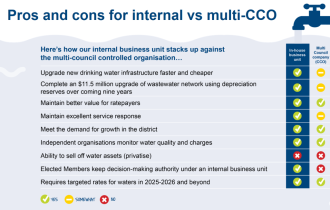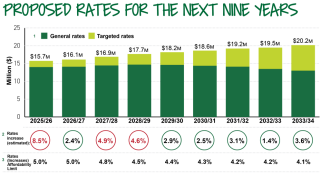 Contents
Contents
Drinking Water Replacement Plan
Stage 1: Consulting on our draft plan
Stage 2: Our preferred delivery model
The two options Kawerau District Council is considering
Pros and Cons of the in-house business unit vs Multi-Council Controlled Organisation
Revenue and pricing requirements under scenarios
What is Local Water Done Well
Local Water Done Well is the Coalition Government’s plan to address New Zealand’s long-standing water infrastructure challenges.
Local Water Done Well covers drinking water, wastewater and stormwater and is split into three legislative parts:
- Councils must establish a corporate structure to deliver water services with an:
- Internal (in-house) business unit OR
- Single-Council Controlled Organisation (CCO) OR
- Multi-Council Controlled Organisation (CCO) OR
- Council and Consumer Owned Organisation
- Consumer trust
- Councils must demonstrate financial sustainability with the preparation of a Water Services Delivery Plan
- The third part establishes the Commerce Commission as the economic regulator of water services in New Zealand
Stage 1: Consulting on our draft plan
Councils must consult on their Water Service Delivery Plans.
Before consulting Council must adopt a “preferred” option and an “alternative” option.
In February 2025, Elected Members confirmed their preferred option was an internal (in-house) business unit.
The alternative option is a multi-Council Controlled Organisation (CCO) with Whakatāne District Council, Ōpōtiki District Council, and Rotorua Lakes Council.
Stage 2: Our preferred delivery model
Council’s preferred option is an internal business unit. This means we keep delivering water services in-house.
Operationally, the most significant changes are in finance. All rates revenue from water must be “ring fenced”.
For the three waters team, the focus will remain on maintaining excellent service delivery to the community.
There will be increased reporting requirements. Council currently reports to Taumata Arowai, but it would also need to supply data to the Commerce Commission.
Even though Council has a preferred option, it must consult with the community and take those views into account.
Once Elected Members have considered feedback from the community, they will confirm which delivery model to include in the Water Service Delivery Plan.
Two options
Kawerau District Council has considered a number of options:
Option 1: Internal - An in-house business unit (Council's preferred option)
This means we keep delivering water services with our internal (in-house) business unit. This is our preferred option.
Operationally, the most significant changes are in finance. All rates revenue from water must be “ring fenced”.
For the three waters team, the focus will remain on maintaining excellent service delivery to the community.
There will be an increased reporting requirement. Council currently reports to Taumata Arowai, but it would also need to supply data to the Commerce Commission.
Option 2: Multi-Council Controlled Organistaion
Join with our neighbours Whakatāne, Ōpōtiki and Rotorua Lakes District Councils to form multi-Council Controlled Organisation (CCO) and deliver water services to our districts.
Pros and cons: internal vs multi-CCO
Revenue and pricing requirements under scenarios
The 2024-34 baseline financial projections shows water services revenues to increase from $4.0 million in 2024/25 to $6.4 million in 2033/34 (+60% over nine years).
This results in average charges per property increasing from $1,285+GST in 2024/25 to $2,020+GST in 2033/34 (+57% over nine years).
The revenue required to fund water service delivery internally (in-house) are in line with the minimum revenue requirements under a regional Multi Council Controlled Organisation (CCO).
Stage 3: submitting our plan
In September 2025 Council must submit its Water Service Delivery Plan having:
- Consulted on a preferred and alternative delivery model;
- Confirmed the preferred model via Council resolution of an internal (in-house) business unit.
The Department of Internal Affairs then assesses Council’s Water Service Delivery Plan to ensure it demonstrates “financial sustainability”.
The Plan must demonstrate financial sustainability by 2028, and amendments to the plan can be made before September 2027.
“Financial sustainability” also has three parts:
1. Revenue sufficiency: Targeted Water Rates - can Council or the CCO raise enough money for operations);
2. Internal business unit: sufficient investment capacity - is Council or CCO planning to invest enough); and
3. Does an internal business unit have financing capacity and debt levels? - can Council or CCO raise enough debt for the required investment?)
Kōrero mai, Let's talk wai
Open for feedback and submissions
You can make a formal submission, which will be tabled with the Councillors and be considered in the decision-making process. The closing date is 23 May 2025.
If you wish to, you can present your submission to elected members at the hearing on 18 June 2025.
You can make a submission:
- Facebook submissions – if you wish to make a formal submission, you will need to do so via messenger or inbox.
- Email submissions@kaweraudc.govt.nz
- Drop in the hard copy submission form from this consultation document to the Council Offices, isite or library weekdays.
- Post the submission form to us: Chief Executive Officer, Kawerau District Council, Private Bag 1004, Kawerau 3169
- Online – use the submission form below:







